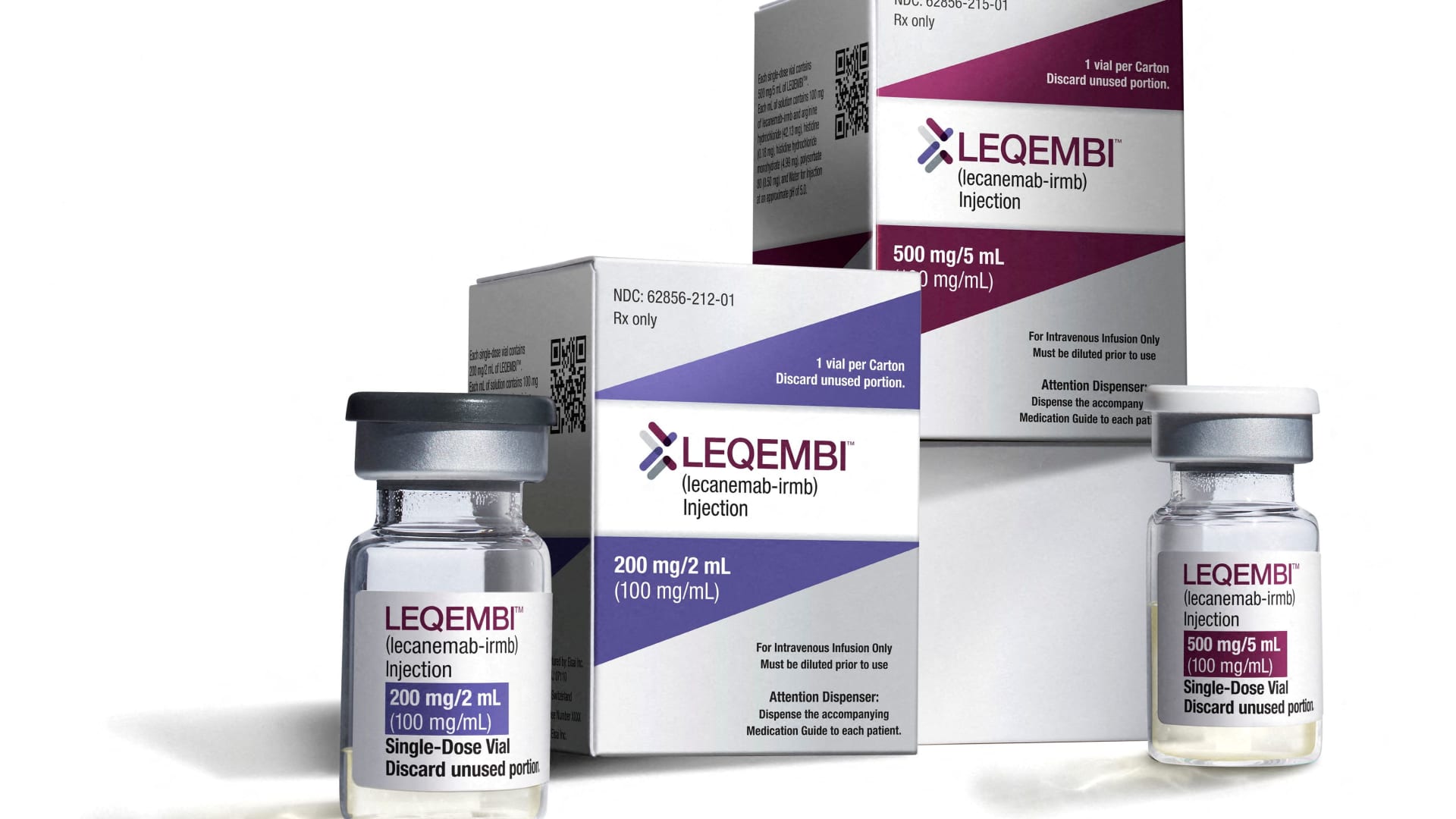[The stream is scheduled to begin at 10 a.m. ET. Please refresh the page if you don’t see a player above at that time.]
A panel of independent advisors to the Food and Drug Administration is meeting Friday to make a recommendation on whether the Alzheimer’s drug Leqembi, made by Eisai and Biogen, should receive full approval.
The FDA is not required to follow the advisors’ recommendation, but a panel vote in favor of Leqembi would help pave the way for the treatment’s approval this summer.
The FDA is expected to make a final decision on Leqembi on July 6. The agency’s decision will determine whether Medicare broadly covers the treatment. The program for seniors is severely restricting coverage of Leqembi right now because it was previously approved through an expedited process.
Leqembi is the second Alzheimer’s treatment from Eisai and Biogen to come under FDA review, after the controversial approval of the drug Aduhelm in the summer of 2021.
The drug regulator granted expedited approval to Aduhelm, developed by the two companies, despite 10 out of 11 advisory committee members concluding that the treatment did not demonstrate a clinical benefit. A congressional investigation subsequently found that the approval of Aduhelm was “rife with irregularities.”
FDA staff said in a briefing document ahead of Friday’s meeting the clinical trial data submitted by Eisai appeared to confirm the clinical benefit of Leqembi for Alzheimer’s patients, suggesting that the agency is poised to approve the treatment this summer.
Leqembi slowed cognitive decline in early Alzheimer’s patients by 27% in the trial, but the treatment also carries serious risks of brain swelling and bleeding. The antibody is administered twice monthly through intravenous infusion.
Small panel due to conflicts of interest
The advisory committee for Leqembi is unusually small, with just six voting members.
Dr. Teresa Buracchio, acting head of the FDA’s neuroscience office, said the smaller-than-usual committee resulted from a number of experts recusing themselves from Friday’s meeting due to conflicts of interest.
“While this group is small, it contains the appropriate expertise necessary to have a robust discussion on the topic at issue today,” Buracchio said.
Buracchio said the FDA’s decision on whom to include in Friday’s meeting was impacted by a letter from the Alzheimer’s Association that advocated for Leqembi’s full approval. At least one member of the FDA advisory committee, Dr. David Weisman, signed that letter.
Weisman was originally granted a waiver to participate in Friday’s meeting despite serving as the principal investigator for Biogen and Eisai clinical trials on Leqembi and another Alzheimer’s treatment called Aduhelm at Abington Neurological Associates.
Weisman subsequently recused himself from the meeting and is not participating.
Acting chair Dr. Robert Alexander was granted a waiver to lead the panel Friday despite holding stocks valued up to $150,000 in companies that compete with Eisai and Biogen. The FDA disclosure did not name the companies.
Alexander is the chief scientific officer of the Alzheimer’s Prevention Initiative at the Banner Alzheimer’s Institute. Banner is conducting an Alzheimer’s clinical trial for a competing firm, and Alexander receives $50,000 to $100,000 in salary per year from funding supporting the trial.
Bryan Marshall, who heads the office that manages the FDA’s advisory committees, asked the agency to grant Alexander a waiver because he has unique expertise that is “invaluable” to Friday’s meeting.
Medicare coverage, price controversy
Leqembi is technically already available on the U.S. market after receiving fast-track approval in January, but very few seniors can access the expensive treatment because Medicare is restricting coverage to only people who are participating in clinical trials. There are no clinical trials underway.
As consequence, most seniors can only access Leqembi if they can afford to pay for the drug out of pocket. Leqembi has a list price of $26,500 per year.
Medicare has promised to broadly cover Leqembi on the same day the FDA fully approves the drug. The Veterans Health Administration is already covering the treatment for veterans.
Members of Congress and organizations that lobby on behalf of Alzheimer’s patients are closely watching Friday’s advisory committee meeting.
Sen. Bernie Sanders, chair of the Senate Health Committee, said the price of Leqembi is “unconscionable” and called on the Health and Human Services Department to take action to slash the price in a letter to HHS Secretary Xavier Becerra ahead of the meeting this week.
Sanders, in his letter Wednesday, said the “FDA has a special responsibility to restore the public trust after its inappropriate relationship with Biogen during the agency’s review of a prior Alzheimer’s drug, Aduhelm.”

